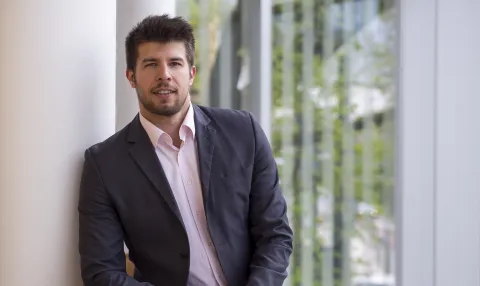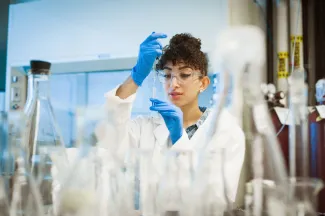“Engaging with people around you will not only bring you new ideas, but will help you execute them.”

Vasilii Triandafilidi
- Degree:
- Doctor of Philosophy
- Grad year: 2020
- Program:
- Campus: Vancouver
Vasilii was a PhD candidate in the UBC Chemical and Biological Engineering (CHBE) program who graduated in May 2020. After a failed attempt to commercialize his research on smart polymers, he quickly pivoted and co-founded Innovation OnBoard (IOB) — the premier entrepreneurship program and competition on campus. In tandem, he leveraged his knowledge of Python and passion for education to enhance the engineering curriculum by co-leading the CHBE course re-design initiative. He and the team raised over $45,000 through the Teaching and Learning Enhancement Fund (TLEF) and created the new, experiential learning-focused content for several courses. The resources he created (OpenChemE.github.io) are open source and have been used by over 400 students, as well as professors from major Canadian universities. Vasilii holds a Master of Science in chemical and biological engineering from UBC, as well as a Bachelor of Applied Mathematics and Physics from the Moscow Institute of Physics and Technology. When not at work, Vasilii enjoys learning new languages, reading history books, listening to podcasts and playing soccer. He is also a blue belt in Brazilian jiu-jitsu.
Why did you choose engineering?
There are two reasons why I ended up studying engineering at UBC: professional reasons and personal reasons. I always wanted to explore new opportunities and experience other cultures outside of the tiny town in Uzbekistan where I was born. Canada was a perfect choice as it is a warm and welcoming country, with great people and big opportunities. Professionally, engineering research is my passion. My research career began when I was 18, when I began using computer simulation techniques called Molecular Dynamics to study the fundamental properties of materials. The moment that I learned about Dr. Hatzikiriakos’ lab at UBC I knew that I had found my niche.
What has made your time at UBC the most memorable?
My time at UBC was split between academic classes, countless hours running simulations for my research and tons of extracurricular activities. My supervisor was generous enough to give me enough academic freedom to pursue my side activities — like entrepreneurship — as long as my actual research was completed. Together with my friend Athanasios Kritharis, I tried to commercialize my PhD research on smart gels; we started by participating in start-up programs and competitions and became dissatisfied with our experiences. Most of the programs were too focused on trying to sell the solution they had come up with rather than discovering the underlying problems that they were supposedly “helping to resolve.” This led to a lot of failure and heartache. To combat this “engineering vision” problem, we created IOB: a platform to match industry problems with student teams to solve them.
In the course of one month, we raised the money we needed and brought together a large group of doctors, environmental and energy specialists with actively unsolved challenges they were facing in their everyday practice. The students and industry professionals formed teams and it was amazing to see their ingenuity on display in solving these pressings problems.
In its first two years, IOB has become the premiere student-run start-up program at UBC, raising $100,000 in funding and in-kind services, and engaging over 200 students in more than 30 student projects. Some of the top graduating ventures from IOB successfully moved into venture-building activities at e@UBC and placed high in the New Ventures BC competition. From disposable coffee cups made out of coffee grounds to an electronic microscope that costs less than a smartphone, these ventures solved regular problems with incredible means. Seeing how our efforts are helping the world combat growing environmental and health concerns makes IOB one of my most memorable experiences at UBC.
What have you learned in engineering that is most valuable?
My graduate degrees in engineering at UBC taught me two main things: to pose and solve complex research problems, and to effectively communicate the results.
I strongly believe that the STEM field is the best way for one to develop effective problem-solving skills. An engineer can solve any problem given enough coffee and sleep deprivation! My graduate degrees taught me not only to solve the close-ended (easy) problems, but also effective ways to solve research problems that have no clear answer. The most important skill I developed was the ability to frame research problems, hypothesize answers and test the hypotheses.
No matter how good you are at solving problems, it is useless if no one understands you! The resources provided to me during my graduate degrees taught me great and effective communication techniques. Thanks to UBC classes, Mitacs workshops, mentorship from my supervisors, colleagues and writing instructors who would volunteer their time outside the classroom, I am able to effectively write, present and collaborate.
How are you applying the skills you learned through your studies at UBC?
The skills that I obtained over my years at UBC recently helped me to get a position in one of the most prestigious management consulting companies, Boston Consulting Group (BCG). To get the position I needed to demonstrate effective problem-solving skills applied to the business world, strong leadership skills and effective communication. Luckily, calculating the market for autonomous cars is no harder than estimating the optimal polyelectrolyte parameters that I do every day for my research. At the same time, through IOB, I have managed to develop and demonstrate effective leadership and communication skills required to jumpstart the organization.
What has been your most memorable/valuable non-academic experience studying engineering at UBC?
In the summer of 2015 I had the pleasure of presenting my research at the Foundations of Molecular Modeling and Simulation (FOMMS) 2015 symposium (one of the best conferences on molecular modeling). It was held in a beautiful remote resort two hours away from Portland, Oregon. Every night after the research sessions, researchers would socialize, discuss work and enjoy a glass of wine. At one of these events I had the pleasure of speaking with Joachim Sauer, a very interesting scientist from Germany; it was only later that I realized I had spoken with the husband of the German chancellor, Angela Merkel. I was amazed by how democratic science is, and how people from completely different circles in society can be united in their pursuit into investigating the laws of nature.
How do you feel a graduate degree in engineering has benefitted you compared to a different field of study?
Besides teaching me to solve complex research problems, engineering is a unique place where you are forced to get your hands dirty from the start. Engineering has an incredible impact on the world and has an amazing community that is ready to help you every time you need it.
Coming from a more theoretical physics and mathematics background, I was very impressed with how determined engineers are with the practical aspects of their work. Engineers don’t spend time pondering possibilities or ruminating over the problems — they engage, build, model and get their feet wet. No problem is too hard for engineers!
Because of our expertise and determination to solve any problems we, as engineers, engage with the most pressing challenges of our time — like climate change, pollution or an aging population. My lab-mates and our collaborators, for example, are working on new soft-gel materials for artificial skin and robotics that can revolutionize the fields of robotics and prosthetics.
Most importantly, despite our focus on working hard to solve important problems, our community invests a lot of time helping the younger generation of engineers with their research and activities. It was because of these connections that we have managed to launch, find sponsors and partners for IOB.
What advice would you give a student considering a graduate degree in engineering?
The first is to invest in the people around you and to not hesitate to ask them for advice. The second is to “sharpen your saw before you cut the tree.”
One of the crucial elements that I have understood while studying in UBC is that learning is not bound to the classroom, and one can learn as much from reading a textbook as from having a conversation with a person who has been in “your shoes” before. So invest your time in finding people in areas that are interesting to you, and make an effort to genuinely engage with these people. Talk to them about the current trends in the industry, ask them their opinions about our path to transition from fossil fuels into sustainable solutions. You never know how these people will help you down the road. A simple conversation in an elevator with an alumnus helped us to find the first crucial funds for IOB.
Steven Covey’s advice that encourages new students to “sharpen their saw before they start cutting the tree” is a principle that I understood during Innovation OnBoard's infancy. As the president of IOB, I was trying to convince our team of my vision for the program but felt disengagement from them. Around that time, I attended the Mitacs Project Management workshop and understood that people don’t like visions set from top to bottom. People prefer visions that are born with joint input and vested interest. Using this knowledge, we re-focused on hearing everyone’s opinion and holding everyone responsible for the result, which, in my opinion, was one of the main factors in IOB’s success. Try to attend as many extra-curricular seminars, lectures and competitions as you can.
Where do you find your inspiration?
For me inspiration comes from an inner curiosity. As prominent science fiction writer Isaac Asimov put it, most great scientific discoveries don’t come with “Eureka!” but with “That's odd. That's funny. Hey, wait a minute!”
My inspiration also comes from being surrounded by amazing people that helped me all the way through: my family and friends, IOB team members, IOB mentors and partners, TLEF team members, CHBE faculty and staff (specifically: Mike Schoen; Dr. Vikram Yadav; Marlene Chow; Dr. Jon Verrett, my mentors: Dr. Tony Yang; Claudio Arato and Blair Simonite and my supervisors: Dr. Savvas G. Hatzikiriakos and Dr. Joerg Rottler) and everyone else that I didn’t mention. I am grateful for all of your help and support!
What are your plans for the future?
My immediate plans are to start my job as a consultant for Boston Consulting Group. In the long term, I want to use the knowledge I will obtain working at BCG to start my own venture with my friends and colleagues. On the personal side, perhaps, to invest time to perfect my practice of the languages I know in order to reach fluency in each.
How will you go on to make a difference in our world?
I come from an under-privileged background: being an ethnic minority in a small city in Central Asia, getting into the high school of my dreams (on the third attempt) and struggling there, but ending up in a top Russian University and now finishing my doctoral degree in Canada and landing a position at BCG. The reason I was able to achieve this was because my family believed in education, and invested everything they had into my and my brother’s education. I want to somehow engage with communities and give back some of the help that I have received, perhaps by providing education or mentorship. Maybe that is why TLEF and IOB felt so rewarding.

